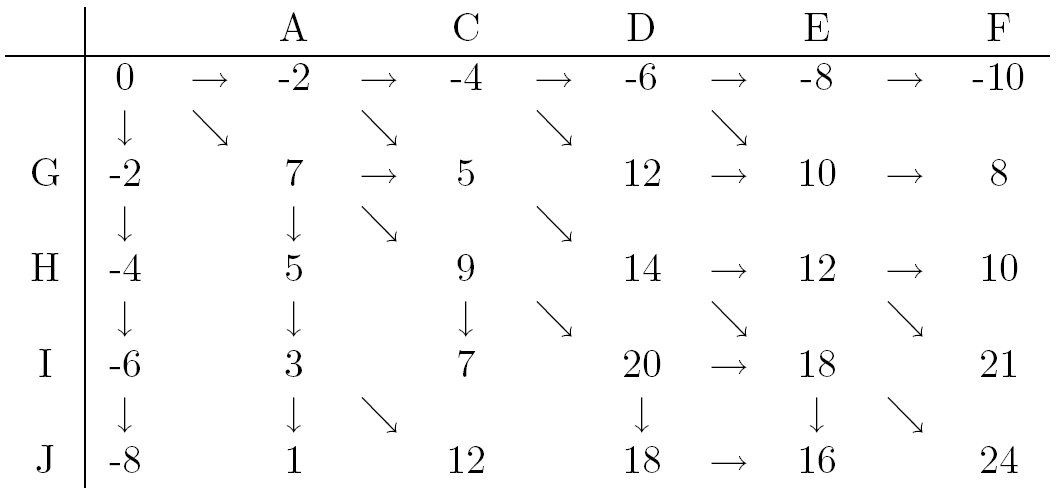Homework #2
Due Thursday, January 22, 2009, at the beginning of class. Assignments turned in more than 5 minutes after the beginning of class will be penalized 10 points, with an additional 10 points every 24 hours thereafter.
The first four questions pertain to the following DP matrix:

-
(10 points) Write down all maximal scoring alignments for the dynamic programming matrix shown above.
-
(3 points) Was this DP matrix generated by the Smith-Waterman or Needleman-Wunsch algorithm? How do you know?
-
(3 points) For this DP matrix, is the gap penalty linear or affine? Give the value(s).
-
(10 points) Draw an empty amino acid substitution matrix, and fill in as many values as you can, based on the above DP matrix.
-
(15 points) Use the BLOSUM62 matrix (found at ftp://ftp.ncbi.nih.gov/blast/matrices/BLOSUM62) and a gap penalty of -4 to find the optimal local alignment of
VKRandLQCTAS. Show your work. -
(10 points) Write a program
copy-file.pythat copies a given file. For example, if you have a file calledhello.txtthat contains one line ("Hello, world!"), then you could create a copy of this file calledworld.txtas follows:> python copy-file.py hello.txt world.txt > cat world.txt Hello, world!
-
(10 points) Write a program
reverse-lines.pythat reads in the contents of a file, and prints out the lines in reverse order. For example, say that your file is calledthree-lines.txtand consists of these three lines:This is the first line. This is the second line. This is the third line.
Your program should do this:
> python reverse-lines.py three-lines.txt This is the third line. This is the second line. This is the first line.
-
(12 points) Write a program
split-number.pythat reads a real number from the command line and prints its integer part on one line, followed by its decimal part (i.e., the digits after the decimal point) on a second line. For the decimal part, print no more than 6 digits after the decimal, but do not print trailing zeroes.> python split-number.py 1.234567 1 0.234567 > python split-number.py 1.23456711 1 0.234567 > python split-number.py 1.23 1 0.23
-
(12 points) Write a program
format-number.pythat takes as input two arguments: a number and a format, where the format is eitherinteger,realorscientific. Print the given number in the requested format, and print an error if an invalid format string is provided.> python format-number.py 3.14159 integer 3 > python format-number.py 3.14159 real 3.14159 > python format-number.py 3.14159 scientific 3.141590e+00 > python format-number.py 3.14159 foo Invalid format: foo
-
(15 points) Write a program called
day-of-year.pythat takes as input a month and a day and returns an integer less than or equal to 365 indicating how many days of the year have passed on that date.> python day-of-year.py January 1 1 > python day-of-year.py December 31 365 > python day-of-year.py February 2 33 > python day-of-year.py August 17 229 > python day-of-year.py Agust 17 Error: Agust is not a valid month.
You can ignore leap years.